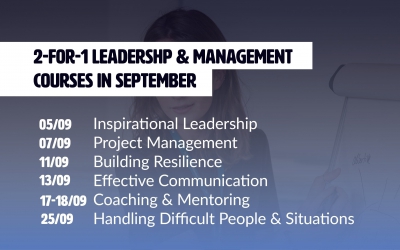Whether you’re an office manager or a project leader, all good leaders require several skills to positively interact with and manage others. With that in mind, below are the 10 workshops and accredited courses we recommend to upskill any Senior Manager or Leader.
Human Resources Toolkit for Managers
All leaders have HR-related responsibilities when managing others. It is important to become aware of what is expected of you, to ensure you remain compliant with the law and to treat your staff appropriately. Learn practical tools to help managers feel more confident in dealing with HR matters.
As a senior member, you may already work long hours and have come to terms with what “work-balance” means to you, however, this may be different from your team’s idea. Understand how to get the best out of your team without exceeding their limits.
Finance for Non-Finance Directors
No matter what level of seniority you are, having knowledge of the company’s finances is essential, to drive results in your department. Understanding finance allows you to interact productively with colleagues in the finance department, exerting a greater influence on decision making.
Emotional Intelligence
As an individual with authority and responsibilities, mastering your emotions is essential in challenging situations. Leaders should have the ability to recognise and understand the emotions of others to build stronger working relationships and know how and when to inspire, motivate, delegate and support teams.
Effective Communication
Having effective communication skills is vital for any individual - even more so for new managers who have been internally promoted and will have to learn how to adjust their communication style to fit their new role and responsibilities.
Performance Management
As a manager, it is your duty to manage and motivate people in order to achieve their best. Being an effective manager you should understand how to manage behaviour, productivity and expectations, and give constructive feedback, in order to get the best out of your people.
Hold yourself accountable for learning, growing and improving, and encourage and appreciate this behaviour among your team members.
Motivation & Delegation
Within any organisation, members of the team need to feel valued in order to perform efficiently. Both motivating and delegating through differing communication styles and techniques helps engage your team’s eagerness in order to successfully achieve targets and objectives.
Influencing & Persuading
Managers are regularly required to influence others in their roles. For example, asking a team member to stay late. Developing a range of communication skills will allow you to effectively influence and persuade your colleagues and help you produces the outcomes you need.
Inspirational Leadership
The ability to inspire people to reach great heights of performance and success is a skill that leaders need. To experience inspiration, people need to feel included and heard. Learn how to lead, organise and motivate a team in order to achieve outstanding performance and results.
Coaching & Mentoring
Mentoring individuals within your team will allow managers to pass on vital skills required to succeed within the organisation. Develop your team and help them unlock their potential. Learn how to build rapport, actively listen and effectively communicate with your mentee.
If you’re looking for a formal qualification to advance and refine your management skills, why not try the ILM Level 5 Award in Leadership & Management. The Level 5 qualification focuses on delivering technical knowledge, strategic insight and practical expertise.
Some people believe that leaders are born, not made. Others, however, think leadership skills can be developed and honed, just like any other ability.
Throughout September on the blog, we are taking a look at the different skills required for managers and leaders to successfully fulfil their duties, and how to get them.
We’re going to start at the beginning of the management journey, with skills for new managers.
Being promoted to manager for the first time is both exciting and challenging. It takes a lot of hard work and reliability to move up the corporate ladder but transitioning into your new role means mastering a new skill set. No matter what kind of business or field you work in, these 6 workshops will give you the skills to navigate the new, undiscovered managerial waters.
Improving your Personal Impact
The ability to understand how you are being perceived - and to manage your interactions based upon both this perception and the communication style of the other person - is vital to building effective relationships. Learn how to build your brand, become more assertive, and handle conflict effectively.
Effective Communication
Having effective communication skills is vital for any individual - even more so for new managers who are internally promoted and will have to learn how to adjust their communication style to fit their new role and responsibilities.
Handling Difficult People & Situations
Not all situations that come before the new manager will be easy to deal with. A main responsibility and obligation as a manager are to address and confront difficult and uncomfortable issues in a professional and confident manner. Improve your assertiveness, the ability to use effective questions and active listening skills.
Negotiating with Confidence
As a new manager, you may be tasked with negotiating with individuals internally and externally. Entering negotiations confidently to ensure that win-win results are obtained. Equip yourself with the ability to reduce the number of negotiations by justifying your position and reducing unnecessary discounting.
Time Management
For all people within the business, time management skills are crucial to delivering results. As a manager, you are now responsible to coordinate the work from a team of people. Learn how to plan and prioritise your workload, eliminate time stealers and manage your new work environment.
If you’re looking for a formal qualification to help you start your journey, why not try the ILM Level 3 Award in Leadership & Management. The Level 3 qualification provides a foundation of managerial skills for new managers, by developing the skills and knowledge to lead, organise and motivate teams. Throughout the programme, you will learn key leadership styles, how to confidently solve problems and make decisions more effectively.
For more information on how we can assist you on your management journey, call Dawn on 01332 836638
Love to learn? We’re back with another amazing offer to make learning more likely – receive 2-for-1 on Leadership & Management courses taking place throughout September.
Why not take this opportunity to try out some of our highly commended courses, whilst gaining the practical skills, knowledge and confidence to make the transition from your current role to business leader quickly and effectively. With our range of instant impact courses, apply your new skills in the workplace immediately through the practical nature of each course.
5th Inspirational Leadership
6th An Introduction to Project Management
11th Building Resilience for Success
13th Effective Communication
17th & 18th Coaching & Mentoring
25th Handling Difficult People & Situations
It’s easy to book online, simply add the courses to your basket and use 24U code at check out. Any issues? We're here to help - call us on 01332 836638 or contact us via email at This email address is being protected from spambots. You need JavaScript enabled to view it.
We also have the following compliance courses available throughout September, that are designed to develop your personal skills and where appropriate meet legislative requirements. To understand the importance of compliance training, click here.
13th Level 2 Award in Food Safety in Catering
14th Level 2 Award in Health & Safety in the Workplace
17th & 18th & 19th Level 3 Award in Full First Aid at Work
24th & 25th Level 3 Award in Refresher First Aid at Work
To see our full list of upcoming courses in 2018/19, click here
Follow us on Twitter to keep up to date with the latest - @RHThinking
Leadership and management isn’t easy. Learning a management theory is great, yet translating this into performance is what matters.
Studying an ILM (Institute of Leadership and Management) qualification certainly shouldn’t be overlooked. It will not only improve your performance as a manager, but it will also increase your employability and enhance your career prospects further.
ILM assessments focus on delivering practical skills and knowledge directly into the workplace. The qualification is founded on work-based learning, with assessments based on projects that relate to the employer, and ensure learning is relevant and applied.
ILM qualifications start at Level 2, (ideally for team leaders) and follow to Level 7 (suited to senior managers) and each level can be achieved at Award, Certificate or Diploma status depending on the number of credits gained.
So what are the benefits of studying an ILM qualification?
The ILM qualification gives you a range of key management skills and techniques to drive better results in the workplace. Building your leadership capabilities, allowing you to motivate and engage teams and manage relationships confidently.
ILM is an incredibly useful qualification as it enables you to undertake units which either you or your employer think are needed in order to suit your requirements and particular skills gap. ILM provides a broad range of optional units, therefore it is a qualification which can be tailored to your organisation’s learning and developmental needs. Set by a series of levels and regulatory frameworks, the qualifications increase with complexity and knowledge as you develop through the framework.
A qualification that grows and develops with you, it allows you to develop as a manager and diversify your skills according to.
At Roundhouse Thinking, we deliver ILM training at Levels 3 and 5. If you would like further information, please click here. Alternatively, give us a call on 01332 836638 or contact us via email at This email address is being protected from spambots. You need JavaScript enabled to view it.
Don’t forget to follow @Rhthinking for the latest news and updates!
6 Essential Qualities you need to become a Leadership Role Model
Leadership is established over time through teaching, learning and experience and is a set of skills acquired, which when combined; equip you with the ability to lead a team to success.
Consider these 6 behaviours to become an effective leader.
• Self-Awareness of your strengths and weaknesses allows you to understand other people and how they perceive you. This in turn increases trust and credibility within your team. It also allows you to implement change effectively within your organisation.
• Listening not only is essential part of communication between you and your team, it also develops trust, enhances motivation and helps detect and solve problems faster.
• Commitment to advance the welfare of employees. Dedicate time to developing your employee’s skills, through coaching, mentoring and training, to help them become better leaders.
• Empathy not only to identify with others but to accept what others contribute to the company.
• Persuasion will influence many stakeholders to follow a course of action. Having influencing skills will assist with organisational change and development.
• Foresight allows leaders to analyse the past to make informed decisions for the future.
Each person embodies at least some leadership qualities; it is how you use and adapt these that determines your success.
Are you looking to develop yourself or your team? We identify skills gaps and integrate training into your business in order to create instant impact and drive results. Learn more.
Don't forget to follow us on Twitter @RHThinking and LinkedIn for more top tips.
Management development is important to businesses who want to take a proactive approach to growth. Training opportunities increase employee retention and motivate employees, resulting in a knowledge and driven workforce. If your business is to grow, you need to invest in the most asset, your employees, and upskilling is an essential growth strategy which can be successfully initiated with our help.
Develop a culture of innovation
Your managers have a thorough knowledge of your business and they are some of the best-placed people to be suggested new products, services or improvements. With training and confidence, you can develop a team of innovation managers, which will ultimately lead the way in business improvement and product development.
Retain your best employees
Employees want to feel as though they are progressing in their chosen career path and improving their skill-set. Ensure you invest in your employee’s professional development. If you fail to do so, this could lead to your employees leaving in search for other opportunities. After all, if employees feel you are investing in their future, they will be more willing to remain where they are, ultimately reducing your costs.
Gain competitive advantage
Maintaining a competitive advantage against your competition is vital. Ensure your managers are equipped with the essential skill sin order to distinguish your business from competition. Whether it is a short intervention to instantly improve an individual or a company-wide training programme, we are able to successful development your managers.
Management success
Management succession planning allows a business to keep moving forward when the inevitable occurs. Succession planning encourages staff development and makes employees aware that you are serious about developing people. Having a successor from within the company can also save time and expenses as well as aiding continuity.
Pattonair is a leading global Aerospace and Defence supply chain service provider – working with a wide range of customers across the world with over 40 years of experience in the industry. With its headquarter in Derby, the company employs around 1,000 people in the UK, USA, Singapore, France and Italy.
Having grown significantly over the past four years and invested heavily in the development of processes and procedures, Pattonair identified the need to develop leadership and management skills across the company.
Pattonair has a policy of promoting from within the company and recognised that a training programme was required to support senior managers whether they were recently in post or had been in that position for longer periods of time.
Although the company supports staff with practical training through apprenticeships and higher education support and whilst senior managers were promoted on the strength of their ability to do the job – there was widespread recognition that the softer skills of people management and team motivation often needed to be addressed.
The company also recognised that, in a competitive recruitment market, it was important to clearly demonstrate to applicants that Pattonair is a company that values and invests in its workforce.
Pattonair worked with us to develop the bespoke PILOT programme – focusing on the ‘softer skills’ linked to relationship building, such as communication, personality profiling, delegation and conflict resolution.
The objective was to support senior managers in their role and to give them the ability to better manage and disseminate skills across their teams to increase efficiency, raise standards and boost productivity.
The company therefore brought together 70 managers from across the company for a series of monthly training sessions over 12 months.
The programme is unique in a number of ways.
It is bespoke to the company with all theoretical training directly linked back to the company ethos and practice.
PILOT was developed in line with the company’s core values and behaviours which are at the heart of the company’s operations:
- Building with integrity, fairness and trust
- Challenge and innovate
- Always putting outstanding service first
- Making ambition work
PILOT was totally inclusive and open to all senior managers regardless of their previous qualifications and training with graduates working alongside vocationally-trained former shopfloor workers who had worked their way up into management roles.
Managers from across the business were divided into groups – enabling them to work with colleagues from different aspects of the business.
Training was classroom based our associates travelling to the USA and Singapore to deliver training there and then European managers travelling to Derby College for the majority of training.
The final sessions, focusing on Pattonair’s financial and achieving zero defects models, were held in- house.
The programme concludes with each team completing a community project which has so far included refurbishment work at a homeless charity’s premises, maintenance projects at an animal sanctuary and dry stone walling in the Derbyshire Dales.
Due to the positive feedback received so far, Pattonair has already returned to us to launch Co-Pilot, which is aimed at section leaders and is planning Auto Pilot as a follow up with the management teams to embed further learning into the workforce development programme.
Pattonair will also be working with Derby College to allocate its employer apprenticeship levy on the expansion of its apprenticeship programme (for young apprentices and for existing staff). This will continue the shopfloor training programmes including warehousing and business improvement techniques and expand into new customer service and administration apprenticeships.
Today, in most fields, presenting information clearly and effectively is an incredibly desired skill.
Whether you are a student, administrator or sales executive, if you wish to start up your own business or apply for a grant, you may well be asked to not only create a presentation but also present it. Understandably, this could be a daunting prospect, yet our blog aims to help you achieve this with ease.
Know your audience
Understanding the needs of your audience can help you tailor your presentation to target their interests and explain how your company can be of use in their specific situation. Whether this be with the use of facts, figures, or using their logo to incorporate an example of a design, it all goes towards helping you create a memorable presentation.
Structure
Introduction
Your opening should be something that makes a connection with the audience. It can be a story, a question, or statistic. Avoid introductions of yourself or your team.
Body
Try to stick to your three most important points. It's more important to engage the audience than overload them with everything you know. It’s a good idea to leave some information out, as it is likely that what you don't cover in your presentation will come up when you take questions.
Keep your aim in mind. You don't have to write out your presentation word for word, instead just remember to refer back to your main points and working toward your desired outcome. It’s important to present both sides of an issue as you will appear more credible if you acknowledge your competitors or any opposing arguments. After you've explained the other side, you can spell out exactly why your company is better or your argument is stronger.
Conclusion
The closing of your presentation is the last opportunity you have to give your audience something to remember. You can then refer back to your opening or end on a clever slogan or a call to action.
Remember to smile
Smiling increases endorphins, replacing anxiety with calm and making you feel good about your presentation. Smiling also exhibits confidence and enthusiasm to the crowd.
Practice... but don’t memorize
Like anything, practice makes perfect, therefore you’ll want to ensure you have left enough time to rehearse your presentation a number of times. While it may seem difficult or sometimes even pointless, it’s essential if you want to deliver a presentation that is going to give you results.
Tip: It’s a good idea to write your speech, or even write bullet points to prompt you when speaking.
Your environment often has a bigger impact on your delivery than you think, therefore experts recommend rehearsing your presentation in various environments, in order for you to feel comfortable with your speech. Try and do a practice run, presenting in front of a friend, colleague or family member, or even record your presentation and play it back to evaluate which areas you need to improve.
Engage with the audience
Remember to engage with the audience. If you have the chance, talk to the people you will be presenting to get a feel of the audience. This will make it easier when presenting and inviting any questions. Welcoming audience participation can boost engagement and make attendees feel like part of a conversation. It also makes you, the presenter, seem much more relatable. Don’t be put off by unexpected questions – instead, see them as an opportunity to give your audience what they want.
Learn from others
Why not attend some conferences? This will allow you to see how others present and understand what potential you detail you could include in your presentation. If you are unable to attend conferences, there's some great examples on YouTube.
For more top tips, follow us on Twitter @RHThinking or follow 'Roundhouse Thinking' on LinkedIn
Team building activities are often favoured by many businesses as they increase morale, improve productivity and develop team skills. One of the many ways employees benefit from completing a team away day is through a sense of achievement and accomplishment. Team building also allows employees to return to the office feeling reinvigorated, often with a new set of problem-solving skills and improved working relationships.
Improve Communication Skills
Team building is incredibly useful for strengthening existing relationships and welcoming new colleagues. By working through an activity as a group, it allows people to apply their skills and break down any barriers between individuals.
People who are not used to working together get a chance to work as part of a team and by working through a task, the wealth of skills within the team is highlighted and the group learns new and varied ways of working together.
Develop team roles
Each team member has the opportunity to take ownership in a team away day. It provides individuals with a platform to focus and develop on what they are best at, and allows them to find their niche within a team so that everyone can best contribute as an individual while still performing together.
Often, an advantage to a company team away day, is that you will be able to get to know your employees better and tap into their potential. Part of participating in a team building day, is that you can learn new things about yourself and others that you may not have previously realised.
Improved relationships
In a busy, high-pressured environment, it can be often difficult for employees to find time to develop new skills and relationships. Away from the office, team building activities allow each member of the team a chance to get to know one another and their strengths and weaknesses.
Long-term benefits
Team building is invaluable, especially because it promotes better working relationships, offers a shared positive experience and allows people to better understand their strengths and weakness. Once these have been identified, you can then look to improve weaknesses.
Positive relationships
Team building provides an opportunity for the team to participate in activities together in an experience where everyone starts with an equal level of knowledge about the given tasks. The day often requires people to use their initiative in order to complete the task successfully. Working on task together, helps to develop relationships quickly, as well as boost morale.
Value your employees
Team building events and away days are among the most effective ways of increasing levels of engagement within an organisation. If employees feel that their contribution is valued, they will be more encouraged to demonstrate effort and commitment to the organisation.
If your team are looking participate in a team away day experience, we can help whatever your location or goals.
Have you ever considered your own leadership style? According to findings, there are four fundamental leadership styles, these being Pragmatist, Idealist, Steward and Diplomat. Leaders can be effective or ineffective with each of these four styles, and there are vast amounts of subtle variations which can determine what kind of a leader a person is.
We take a look at the defining features of all four categories – Can you identify your leadership style?
The Pragmatist
• High standards and expect themselves and their employees to meet those
• Driven and competitive
• Bold thinkers
• Least common of all leadership styles.
The Idealist
• High-energy achievers
• Believe in the positive potential of everyone
• Want to learn and grow
• Charismatic
• Open minded
• Prize creativity from themselves and others.
The Steward
• Dependable
• Loyal and helpful
• Values rules, process and cooperation
• Stabilising and calming.
The Diplomat
• Kind, social and giving
• Typically develop deep personal bonds with their employees
• Resolve conflicts peacefully
• Socially adept.
There isn’t a correct style of leadership and it certainly cannot be defined into a specific role. Often leaders today take defining features from each style in order to develop their own leadership style and capabilities. It’s incredibly important to understand your own style as you can then start to think about how to develop this further to achieve even greater results.
For more helpful tips, follow @RHThinking!
Sources
www.forbes.com/sites/markmurphy/2015/07/09which-of-the-4-leadership-styles-is-yours/#405020f411a2








